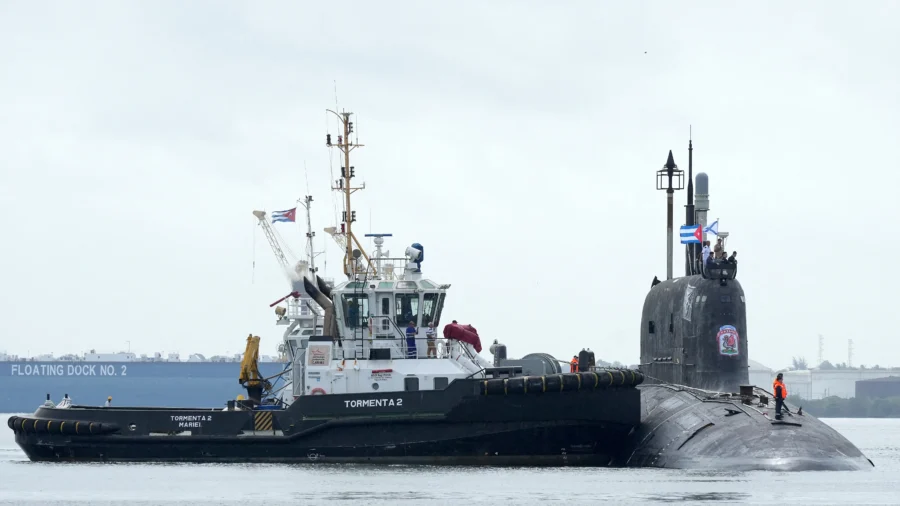A group of Russian warships arrived in Cuba on Wednesday in a show of force amid worsening relations with the United States.
The Russian Ministry of Defense told the Russian TASS News agency that the Russian Navy’s Admiral Gorshkov frigate, its Kazan nuclear cruise-missile submarine, its Akademik Pashin medium tanker, and its Nikolay Chiker rescue tugboat all pulled into Havana on Wednesday hours after conducting a series of “precision” missile drills in the Atlantic.
Havana is just 100 miles from Key West, Florida, home to a U.S. Naval Air Station. The Russian military drills also come as President Joe Biden’s administration has increasingly permitted Ukrainian forces to strike targets inside Russia’s borders with U.S.-donated weapons.
Russian President Vladimir Putin has recently warned that continued Western support for Ukraine, including support for strikes inside Russia, risks a direct confrontation. Last week, the Russian president told reporters he was considering “symmetrical responses,” including supplying weapons around the world that can target countries enabling Ukrainian forces to strike inside Russia.
For now, the Biden administration hasn’t offered public signs of concern over the presence of the Russian warships so close to the U.S. mainland.
The U.S. Southern Command (SOUTHCOM)—the U.S. military component responsible for monitoring and responding to national security threats arising in Central and South America, and the Caribbean—indicated Russian naval visits to Cuba are not entirely uncommon.
“We routinely monitor for activities of concern near the homeland and in the region. When detected, we track those activities very closely,” SOUTHCOM spokesman Steven McLoud told NTD News in an emailed statement. “We’re aware that Russian naval ships may transit the Western Hemisphere and dock in Cuba and Venezuela. We are not surprised by this given Russia’s long history of Cuban port calls. While our force posture has not changed, we remain staunchly focused on our national defense mission.”
Nevertheless, this Russian naval visit comes at a time of heightened tensions with the United States. Cuba has played a part in other moments of heightened tensions between Washington and Moscow.
The Cuban Missile Crisis that played out over 13 days in October 1962 began after the Soviet Union moved to place nuclear missile launch sites on Cuba in response to U.S. nuclear weapons deployments in Turkey. The ensuing standoff is widely considered to have been the closest the United States and Soviet-era Russia came to a direct nuclear conflict before then-U.S. President John K. Kennedy and then-Soviet Premier Nikita Khrushchev reached an agreement to de-escalate.
The Russian government and the Cuban regime have maintained friendly relations for decades, and the two countries have continued to build ties in recent months.
Russia delivered 90,000 metric tons of Russian oil to Cuba in March to help alleviate shortages on the Caribbean island nation and has promised to help Havana in projects ranging from sugar production to infrastructure, renewable energy, and tourism.
Cuban head Miguel Diaz-Canel also met with Mr. Putin for the fourth time in May, when he attended a military parade and said Moscow could always count on Havana’s support.
On Wednesday, Russian Foreign Minister Sergey Lavrov hosted his Cuban counterpart, Bruno Rodríguez, for talks in Moscow. Speaking to reporters after the talks, Mr. Lavrov thanked the Cuban authorities for continuing to express support for the Russian campaign in Ukraine and for affirming the Kremlin’s views of the ongoing conflict there.
“From the very beginning, Havana gave an assessment of what was happening, outlining the absolutely correct, true reasons for what was unfolding [in Ukraine],” Mr. Lavrov said.
Reuters and the Associated Press contributed to this article.

